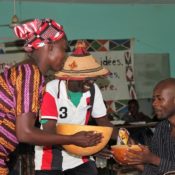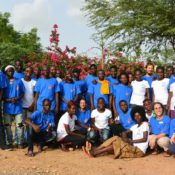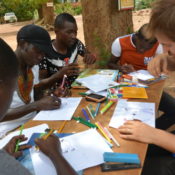“By leaving no child behind, we are creating a better world”
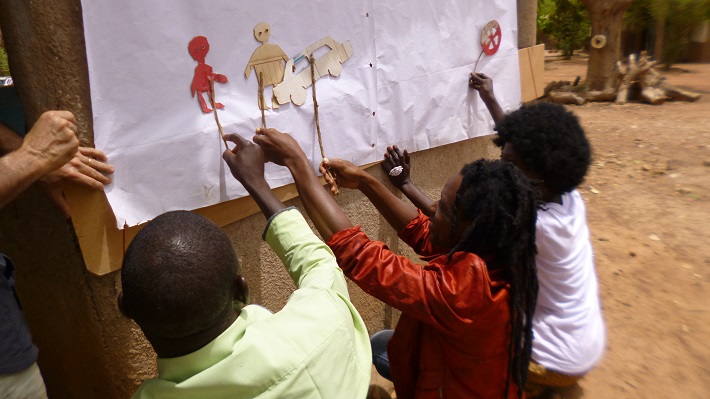
On 10-14 June 2015, a training session was held for in Ouagadougou, Burkina Faso, for young people who work with children. There were 35 participants present from six African countries, including Burkina Faso, the Central African Republic, the Democratic Republic of Congo, the Ivory Coast, Senegal, and Tanzania. All of them are engaged in sharing knowledge with children by facilitating activities such as Street Libraries that are held in a marketplace, on riverbanks, or under the streetlights, or with Festivals of Learning, or other community initiatives.
Getting to know each other and recognising one another’s commitment to children
The session was organised both to reinforce the personal commitment of each participant and also in link with ATD Fourth World’s priority action for 2013-2017: “Building Knowledge and Accessing Education—Every Mind Counts”.
Participants were able to get to know each other and to discover the variety of informal educational projects run by others. They said:
“Here, I’ve seen other young people who have a strong commitment to children. That really motivates me.”
“This shows that I’m not alone with this challenge.”
“What touched me were the different creative objects that participants brought to present their work to all of us. Each one showed a different technique for teaching children. Our common goal is for no child to be left behind and for all children to be ensured a bright future. If each of us pitches in, we will achieve this goal.”
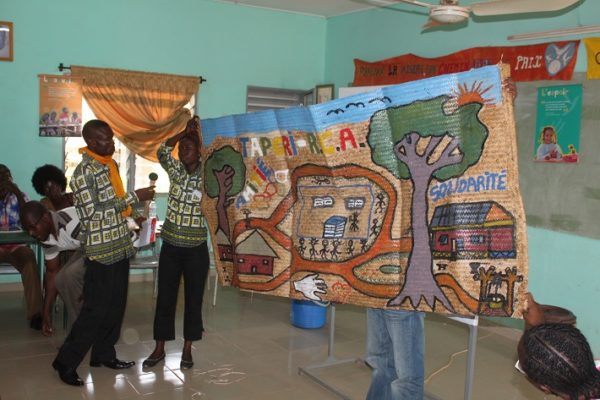
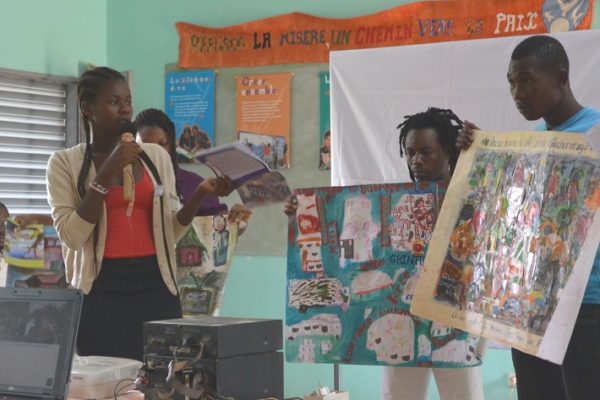
Forum theatre is an interactive technique used during the training session. It allowed young people to brainstorm about ways to overcome specific difficulties they had experienced in the past. Among these challenges: the difficulty of ensuring that a group of children is friendly and respectful to every single child; or a lack of understanding of children’s parents or of the young people’s own families and friends about why they volunteer their time with children.
By acting out these situations with Forum theatre, many ideas were sparked. To broaden understanding of their activities, the young people encouraged one another: to approach village leaders and other authorities; to recruit some parents to share information with their neighbours; or to facilitate activities in tandem. When there is a pair of facilitators, one can focus on running the activity with children, while the other can be more attentive to the group dynamics, looking out for a child who may be left out or disruptive, and speaking with parents when they happen to pass by.
Participants worked for a long time on understanding the ambition behind for their actions. They asked one another: “What do we most want the children to learn? How can parents benefit by letting their children participate? What does the whole community gain as a result of our activities?”
Summing up, some of the participants said:
“Both children who don’t go to school and others who are lucky enough to be enrolled can join together in the same activities. They can then exchange ideas. This teaches children in different situations to feel a sense of community with each other.”
“Gaining the trust of parents can also enable them to come and share their knowledge with children. Each and every family has something valuable to contribute.”
“In our society, a child is a product of his or her community. If a child succeeds, then the whole village has also succeeded. Our activities make an additional contribution to this social cohesion, particularly in new neighbourhoods where people don’t know each other yet.”
Four delegations show how they carried out particularly successful actions
In refugee camps in Central African Republic, facilitators have been training children in activities that encourage them “not to let their brainpower get rusty” and “not let their spirits be overcome by violence”. Gisele and Modeste, the two participants from Bangui, presented the “albums of peace”, created by children.
Rene, who comes from Bukavu (Democratic Republic of the Congo), explained how a whole community became mobilised for mutual support projects, starting from the children whose spirit of friendship had created ripples.
Lamine and Aissatou presented a booklet made with children from the Street Library in a neighbourhood on the outskirts of Dakar (Senegal). They also explained how the children’s fondest dream was that their neighbourhood could be nicer. As made evident in their booklet, this dream has begun to materialize through frescoes they have painted on the walls. The murals were made with the help of a sculptor from a neighbouring community — which had rejected him. Because of his artistic involvement with the children, he regained a level of respect from his neighbours.
Finally, Elise, from Ouagadougou, spoke about her own experience, showing how an activity that gathers together different children from a neighbourhood can also be a way of building community support for the most marginalised of families.
During each day of the session, time was devoted to exchanging educational techniques that helped participants to improve what they already do, despite a lack of resources. These techniques included: paying attention to and valuing children’s own words; storytelling by using shadow theatre; displaying children’s drawings for others to admire; learning to make a book which answers a question asked by the children; learning cooperative games; getting children involved in the facilitation of the activities; making jewellery from pieces of fabric, etc.
These workshops were greatly appreciated, as participants gained insight from one another. One was struck that the shadow theatre was prepared with ordinary cardboard and pieces of salvaged wood. She said, “You don’t necessarily need a lot of resources in order to run a good activity.”
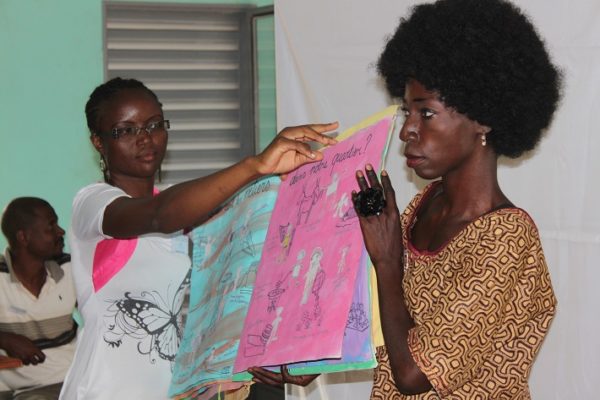
As is often the case, it was through telling one another about their experiences that participants found the most strength and inspiration. “I feel strengthened by learning that the efforts we make, however small, can bring change to the life of someone in difficulty who is excluded from society.”
They also said they gained in conviction that education comes not only from schooling, but also from what each child learns from their family, neighbourhood, and village. One added, “I’ve also learned how educational activities can bring peace to a country; the peace in the hearts of children.”
This session showed that the word “facilitator” does not fully convey what is achieved. In fact, these young people who ensure that children can take part in cultural activities are actually sharing knowledge, as well as bringing unity to fractured communities. As “peace builders,” they act as big brothers and sisters who show children a path toward their future. They have a lot to be proud of.
Download the ‘Guide to Organising Activities with Children‘ created during this training session.


